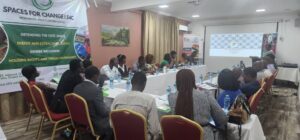25 non-governmental organizations (NGOs) in Ghana enrolled for SPACES FOR CHANGE’S | S4C’s NGO Regulatory Clinic held on November 9, 2023, in Accra, under the banner of the Civic Space Resource Hub CSR-Hub. From Nigeria to Senegal and now Ghana, S4C has organized NGO Regulatory Compliance Clinics to enhance the organizational effectiveness of NGOs by building their capacity to comply with extant national and international regulations applicable to charities.
Facilitators drawn from S4C, international organizations, and Ghanaian regulatory bodies took turns to walk participants through the legal frameworks governing the NPO sector in Ghana and the accompanying compliance obligations. Presentations drew parallels between regulatory compliance obligations applicable to non-profits in Nigeria and Ghana. For instance, the Corporate Affairs Commission is to Nigeria what the Registrar General’s Department is to Ghana. The clinic covered diverse topics, including corporate governance best practices, regulatory filings, internal policy formulation, and enforcement mechanisms.
Dedicated sessions further focused on deepening participants’ understanding of the risks of terrorist financing and proliferation financing that NPOs may face in the course of their charitable operations. This also prompted a comparison between the findings of the terrorism financing risk assessments (TFRA) of the NPO sector in Ghana and Nigeria. While Ghana’s TFRA identified faith-based organizations and charitable organizations as the entities most vulnerable to terrorism financing, Nigeria’s TFRA identified humanitarian and service provision organizations operating in high-risk areas as being most vulnerable. Also, NPOs in Ghana are still classified as designated non-financial businesses and professions (DNFBPs) while NPOs in Nigeria have since been removed from the list of designated non-financial institutions. The comparative analysis of Ghanaian and Nigerian laws sheds light on the divergent approaches adopted by different governments to regulate charities.
With the recent amendment of R8, it is hoped that another TFRA exercise scheduled in Ghana in the coming year will incorporate the recent changes to FATF’s Recommendation 8, especially the directive to refrain from classifying NPOs as DNFBPs. This will ostensibly, signal a potential removal of governmental restrictions and burdensome regulatory measures imposed on the NPO sector in the country. A noteworthy aspect of Ghana’s regulatory approach is the “no penalty” approach of regulatory bodies, which simply means that non-compliance does not incur harsh penalties.
Elated about the new knowledge gained from the workshop, many participants expressed an intention to conduct step-down training for their colleagues. With their heightened understanding of their compliance obligations, it is hoped that this will translate to significant improvements in the regulatory compliance culture among NGOs in Ghana.




